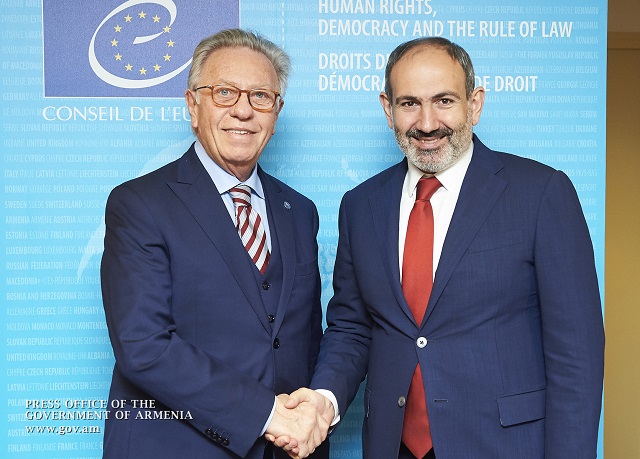The Armenian Weekly. One of the primary objectives of Armenia’s Velvet Revolution of 2018 was to reform the country’s judicial system and end corruption in all courts of law. Armenia has gone through two years of internal efforts to this end. These efforts were leading up to a referendum on constitutional changes. However, this highly anticipated referendum was delayed due to the COVID-19 pandemic. Meanwhile, the Council of Europe’s Parliamentary Assembly (PACE) recommended that Armenian authorities consult with the Venice Commission on the matter. This has put Prime Minister Nikol Pashinyan in a predicament whereby he needs to balance international cooperation, necessary internal reforms and limitations posed by the pandemic.
The referendum—originally scheduled for April 2020—was proposing the amendment of Article 213 of the Armenian Constitution. Article 213 ensures that Constitutional Court judges appointed before 2018 can remain on the bench for many years despite the 12-year limit introduced in 2015. The elimination of Article 213 would have facilitated the potential removal of those judges, many of whom are extremely suspect amongst the Armenian public.
Nevertheless, this unexpected chain of events has forced the government to come up with a new plan of action. The goals of the referendum will now be handled and resolved through parliamentary means. The exact proposals are unclear, but it is assumed that a compromised solution will involve appointing a new president to the court and instituting a phased resignation plan; rather than remove all questionable judges in one fell swoop, they will be retired two at a time. The exact details are awaiting approval from the Venice Commission.
The Venice Commission, otherwise known as the European Commission for Democracy through Law, is an advisory body of the Council of Europe. It consists of independent experts in the field of constitutional law who provide legal advice to the countries of Central and Eastern Europe in times of urgent need. In February, the Council of Europe’s Parliamentary Assembly recommended Armenian authorities consult the Venice Commission before instituting any reforms. PACE rapporteurs for Armenia, Andrej Sircelj and Kimmo Kiljunen, have warned, “The proposed changes could have long-term repercussions on the functioning of constitutional institutions.” Additionally, Gianni Buquicchio, the president of the Venice Commission, doused skepticism on an expedited Armenian solution, saying early retirement of judges should be “truly voluntary.”
Read also
The concerns of the commission and other Strasbourg-based organizations would be more legitimate if Armenia had a proper functioning judicial system to begin with. Separation of powers is a valid concern when there is an established tradition of independent courts. However, these “concerns” disregard the realities of post-revolutionary dynamics where each branch of government must first establish new credibility amongst the people. The Constitutional Court and the entire Armenian judicial system have not enjoyed the trust of the Armenian people for more than two decades. The words “court” and “corruption” have been perfectly synonymous with one another from Shirak to Syunik. There has been no separation of powers; the judicial branch served the previous executive branch with no regard to the Armenian Constitution and Armenia’s laws.
The total corruption of Armenia’s courts and their complete lack of independence were the driving force behind the 2018 revolution. Therefore, it should come as no surprise that the Constitutional Court president Hrayr Tovmasian is currently being charged with two counts of abuse of power. It is only natural that the public demands a complete makeover of the judicial system and the removal of corrupt officials.
Top Armenian legal experts are now critical of PM Pashinyan’s more “lenient” Euro-friendly approach. They view the new plan of action as minimalistic and remain skeptical about consulting the Venice Commission. Additionally, there are concerns regarding the impartiality of the legal experts representing Armenia at the Venice Commission.
Lousineh Hakobyan, the co-founder and the president of the Europe in Law Association (ELA), believes that two of the three Armenian delegates at the Venice Commission— Vardan Poghosyan and Gagik Harutyunyan—cannot act in an impartial and unbiased way.
Poghosyan, for example, has recently been appointed as Tovmasian’s advisor in the Constitutional Court! How is Mr. Poghosyan capable of impartiality in this situation? On the one hand, he is proposing recommendations regarding the removal of Mr. Tovmasian from the Constitutional Court, and on the other hand, he is advising him. Impartiality is impossible.
As for Harutyunyan, the main cause for concern is his long-standing relationship with Buquicchio. In 2015, the president of the Venice Commission supported the Armenian constitutional “reforms” that famously served as a ploy to extend President Serge Sarkisian’s hold on power. Mr. Buquicchio visited Armenia at the time and vocally backed the pro-Sarkisian façade… despite the Armenian public’s disapproval. Mr. Buquicchio thought the 2015 “reforms” were democratic. He could not have been more wrong.
In other words, Armenia is seeking approval from a commission that has previously held skewed ideas on what democracy looks like, while the Armenian “independent experts” are not independent at all.
This diplomatic initiative is overly political and is solely aimed to demonstrate Armenian cooperation with international partners. PM Pashinyan is trying to comply with international expectations while still pushing for reform. As a result, momentum is being lost. Still, for the Armenian public no issue has more importance than this. A proper judicial reform will consolidate the changes that Armenia has gone through for the last two years. It will ensure that there is no turning back to injustices of the past. The success of the reform will determine the new future of Armenia not only in the eyes of the international community, but most importantly, in the eyes of Armenian people who fought for it.
Nuard Dallakyan
Photo: PM Nikol Pashinyan & Gianni Buquicchio, President of the Council of Europe Venice Commission (European Commission for Democracy through Law) in Strasbourg, April 11, 2019


















































